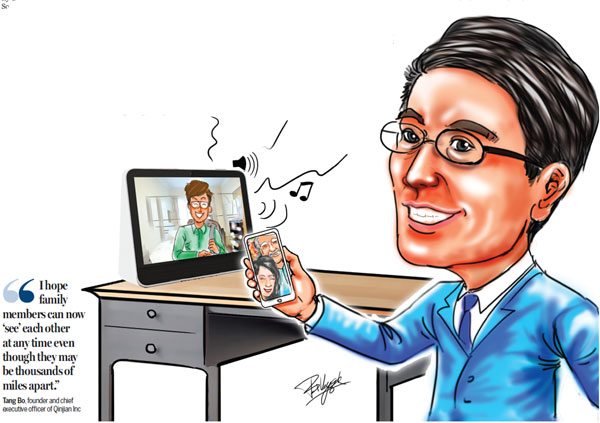You're always by my side, that's how I see us
Updated: 2018-03-23 07:17
By Chai Hua in Shenzhen(HK Edition)
|
|||||||||
Shedding post-holiday blues triggered by emotional family reunions during the all-important Spring Festival in a nation that boasts "unshakable" traditional family bonds seems an uphill and painful task for many.
Not least for the elderly and children "left-behind" in the rural areas by the working middle-aged generation who have migrated to the city to make a living. This special group of people are likely to return to a solitary lifestyle after the sometimes boisterous and tearful reunions.
But, the rapid advent of the technology age may now help them address that solitude.
"I hope family members can now 'see' each other at any time even though they may be thousands of miles apart," says Tang Bo, founder and chief executive officer of Beijing-based Qinjian Inc.
He revealed his "weapon" at a recent event in Shenzhen - video chatting - one of the most significant functions of Qinjian M10, an intelligent speaker with a 10-inch screen in front. "Qinjian" literally means "meeting face-to-face" in Chinese.
"As urbanization in China intensifies, population mobility is becoming too frequent. So, most of the elderly people, middle-aged parents and their children are not living together," notes Tang.
"For those who do live under the same roof, it's very likely everyone will be fiddling with their mobile phones," he says, calling the situation the "era of self-net".
He has since devoted his efforts to the development of a product that family members could share their interests and form a "family net".
Nowadays, our homes are stuffed with all kinds of smart terminals. Why not just use the mobile phone or lap-top to have a video chat?
But, he still believes the interaction ability of these devices is just inadequate. "Users are getting lazier, especially the young ones who were born after 1995, like my daughter."
"But, if they can have the service with just a shout, they would love it," he says, and Qinjian M10 is preset with video, music and many other functions so that users don't have to download these fundamental applications themselves.
He believes ideal interaction efficiency should be 10 times greater than that of mobile phones and pads, pushing user experience to the "extreme".
Voice interaction, he says, should be clearly audible and easily understood not only in a quiet environment, but even when the user is far away listening to music, or the kitchen ventilator is on.
Getting the "extreme experience" isn't too big a problem as the startup's interaction system is backed by Xiaowei - an intelligent service platform developed by Tencent Cloud.

Wang Long, vice-president of Tencent Cloud, said at the launch of Qinjian M10 in Shenzhen that Xiaowei incarnates "all of Tencent Cloud's artificial intelligence ability" on a terminal device, including facial recognition, voice interaction or digital content.
Xiaowei is open to manufacturers of soundbox, television, toy and even vehicles through the access of software developer kits. It also provides a Skill platform, like an application market for mobile phones, covering the aspects of real-time translation, music, radio broadcasting, video chatting, weather, time and education.
"Qinjian" has been cooperating with Tencent since the middle of last year. Apple also unveiled its own intelligent speaker and home assistant HomePod in 2017. With the entry of the consumer-electronics titan, competition in the already hot market for smart speakers has intensified.
Retail sales of intelligent speakers in 2015 reached 10,000 units, but soared to 60,000 in 2016. However, with a new batch of products hitting the market in the second half of last year, sales are expected to reach 350,000 in 2017 and 1,200,000 units this year, according to a report by GFK China, a consumer and market research firm.
However, the report says homogenization has become salient, and another problem is that most Chinese consumers don't have the habit of using speakers, unlike their counterparts in Western countries.
Tang believes the speaker's display could enhance its usability. On one hand, it can support more functions, like watching a movie or making a video chat. On the other, mixed interaction of voice and touch screen is more suitable for users at present, compared to those indirectly controlled by smartphones.
When it comes to privacy protection, Qinjian M10 has a button to shut down all its microphones and cameras. The company says it's not an open platform yet, so it's "almost impossible" for it to be hacked into.
grace@chinadailyhk.com

(HK Edition 03/23/2018 page7)